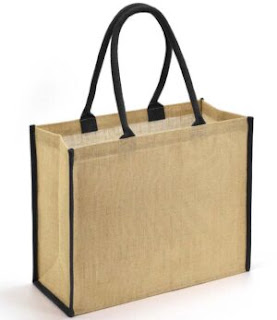Why Recycled Cotton Bags Are the Most Eco-Friendly Choice : Exploring the World of Cotton Bag Factory
Introduction
In an era marked by growing
environmental consciousness and a shift towards sustainable living, the textile
industry is undergoing a transformation. One segment that has gained
significant prominence is the production of eco-friendly bags, with printed cotton
bags and jute
shopping bag leading the way. The fascinating world of cotton bag
factories, exploring various aspects such as the production of printed cotton
bags, jute shopping bags, wholesale distribution of printed cotton bags, and
the rise of recycled cotton bags.
Printed Cotton Bags: A Canvas
for Expression
Printed cotton bags are more than
just utilitarian carriers; they are canvases for artistic expression and
effective tools for conveying messages. These bags are made from natural cotton
fibers, which are not only biodegradable but also highly durable. The
manufacturing process typically involves sourcing organic cotton, printing
eco-friendly designs, and sewing them into bags of various sizes and styles.
One of the primary advantages of
printed cotton bags is their versatility. They can be customized with intricate
designs, logos, slogans, or any artwork that reflects a brand's identity or a
cause's message. This customizability has made them immensely popular among
businesses for promotional purposes. Whether it's a grocery store, a boutique,
or an eco-conscious brand, printed cotton bags serve as an excellent marketing
tool that carries the brand's message far beyond the point of sale.
Furthermore, printed cotton bags
are not limited to branding alone. They are also used for personal expression
and as fashion accessories. Many individuals opt for unique printed cotton bags
as a way to showcase their individuality and environmental values. As a result,
cotton bag factories play a crucial role in providing consumers with
sustainable and stylish alternatives to plastic bags.
Jute Shopping Bags: The
Natural Elegance
Jute, often referred to as the
"golden fiber," is a natural and biodegradable material that has
gained popularity as a sustainable alternative in the bag manufacturing
industry. Jute shopping bags are known for their durability, strength, and rustic
elegance. These bags are crafted from jute fibers, which are extracted from the
stalks of the jute plant.
The production of jute shopping
bags typically involves harvesting, retting, and spinning jute fibers into
threads. These threads are then woven into sturdy fabric, which is used to
create a wide range of bag styles, from simple totes to intricate, high-fashion
designs. Jute's natural brown color is not only visually appealing but also
eliminates the need for harsh dyes and chemicals during the manufacturing
process, making jute shopping bags an eco-friendly choice.
Jute shopping bags are highly
sought after for their sustainability and style. They are commonly used for
grocery shopping, as they can carry heavy loads without compromising on
strength. Additionally, jute bags are often used as gift packaging due to their
elegant appearance, giving a touch of sophistication to any present.
Printed Cotton Bags Wholesale: Meeting Demand Sustainably
The demand for eco-friendly bags,
including printed
cotton bags wholesale, has been steadily on the rise. In response to
this demand, many cotton bag factories offer wholesale services. This allows
businesses to purchase these bags in bulk, reducing costs and environmental
impact.
Wholesale printed cotton bags
come in various shapes, sizes, and designs to cater to the diverse needs of
businesses and organizations. They can be customized with specific branding
elements, making them ideal for marketing campaigns, trade shows, or promotional
events. The availability of wholesale options ensures that sustainable
alternatives are accessible and affordable for businesses of all sizes,
promoting a wider adoption of eco-friendly practices.
Recycled Cotton Bags: Closing
the Loop
In the quest for sustainability,
the textile industry is increasingly focusing on recycling and upcycling
materials to reduce waste and environmental impact. Recycled cotton bags are a
prime example of this eco-conscious approach. These bags are made from
post-consumer or post-industrial cotton waste, diverting textiles from
landfills and giving them a new lease on life.
The manufacturing process of
recycled cotton bags involves collecting discarded cotton textiles, sorting
them by color and quality, and then shredding and re-spinning the fibers to
create new yarn. This yarn is used to weave or knit recycled cotton fabric,
which is subsequently fashioned into bags. The result is a product that
combines the durability of cotton with the eco-friendly benefits of recycling.
Recycled cotton bags offer a
double benefit: they reduce waste and conserve resources. By utilizing
discarded textiles, these bags help decrease the need for virgin cotton
production, which is resource-intensive and can lead to habitat destruction and
excessive water use. Moreover, recycled cotton bags have a unique, vintage
aesthetic that appeals to those who appreciate sustainable fashion and design.
Conclusion
The world of cotton bag
manufacturing is evolving to meet the demands of environmentally conscious
consumers and businesses. Printed cotton bags and jute shopping bags are
leading the charge, providing eco-friendly and stylish alternatives to plastic
bags. Wholesale options make these sustainable products accessible to a broader
audience, while recycled
cotton bags demonstrate a commitment to closing the recycling loop and
reducing textile waste.
As we continue to prioritize
sustainability, cotton bag factories play a crucial role in producing these
eco-conscious alternatives. Through their innovation and dedication to
environmentally friendly practices, they contribute to a greener, more sustainable
future—one cotton bag at a time.




Comments
Post a Comment